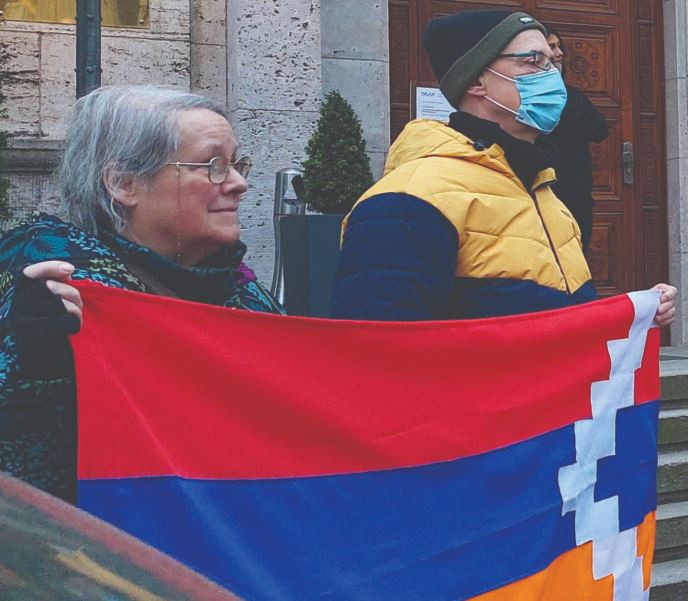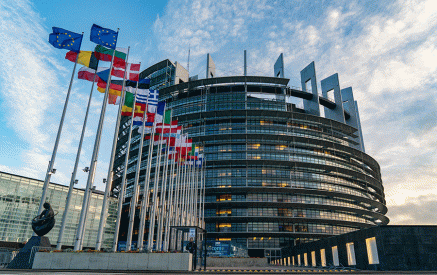by The Armenian Mirror-Spectator
BERLIN/FRANKFURT — After massive intimidation efforts by Azerbaijani organizations and the ambassador in Berlin, the hybrid book presentation of The Cultural Heritage of Artsakh will only take place digitally, instead of in person, it was announced on March 6 in a statement issued by the International Society for Human Rights (ISHR).
In an open letter on March 3, 20 Azerbaijani organizations called on organizers to cancel the book presentation. The letter was even published by the Azerbaijani state-run news agency azertac.
Read also
The event, which was organized by the German Council on Foreign Relations (DGAP) and the Konrad Adenauer Foundation, is a thorn in Baku’s side. The ISHR condemns the political influence on freedom of assembly and expression in Germany, which is accompanied by intimidation and threats.
The event, titled “Protection of the endangered cultural property of Nagorno-Karabakh” with the presentation of the book Cultural Heritage in Artsakh and a symposium became the victim of a digital smear campaign. The intimidation included the mass sending of e-mails with the same content by pro-state NGOs from Azerbaijan masquerading as civil society. In addition, there were numerous complaints by telephone, and the Azerbaijani ambassador had also wanted to prohibit the mention of the term “Nagorno-Karabakh cultural asset.” The massive encroachments on freedom of assembly, academic freedom and freedom of expression in Germany show the brutality and determination of the Aliyev regime. “Opposition voices are not only persecuted and fought in their own country, but now scientific discourse abroad is also being aggressively attacked,” wrote the ISHR.
Turkey and Azerbaijan have been pursuing a destructive policy against Armenia for three decades. After the Nagorno-Karabakh region (Republic of Artsakh) was ethnically cleansed in September 2023 after months of blockade, siege and a military offensive, they seem poised to launch another military attack to seize land in southern Armenia. Last but not least, representatives of the Aliyev regime accuse the Armenians of criminal appropriation of their own millennia-old cultural heritage and deny their right to exist in the state of Armenia, which they call “Western Azerbaijan.”
In addition, Russian President Vladimir Putin’s angry statements have been extremely worrisome, and the ISHR therefore warns of the existential danger for Armenia. While Russia’s war of aggression against Ukraine is of public interest, the massive danger to Armenia remains a side note, the Frankfurt-based human rights organization complains.
More than 100,000 Armenians were expelled after the victory of the Azerbaijani army in the war over Nagorno-Karabakh, and state institutions were dissolved at the beginning of the year. Now there are fears that the millennia-old Armenian cultural heritage in the region could be destroyed by the Azerbaijani army – similar to what happened in the Azerbaijani exclave of Nakhichevan in 1997 and 2006: 28,000 monuments were destroyed there, and an Armenian cemetery had to make way for a military training area. There are very good reasons to ask what international protection could look like, says Dr. Tessa Hofmann, an expert on Eastern Europe: “Currently, Azerbaijani forces are destroying Armenian cemeteries in Artsakh and bragging about their deeds on social media.”
Hofmann is co-author of the anthology The Cultural Heritage of Artsakh, which was to be presented at DGAP on March 6 event.
“This protest is accompanied by public tweets, e-mails and messages from bot accounts that flood the accounts of the editor-in-chief of the magazine IP, the managing director of DGAP and the former director,” Wiebke Ewering, head of press and communications at DGAP said.
Parallel to the event, Berlin authorities approved a demonstration by Azerbaijani organizations in front of the DGAP against the alleged ignorance of Armenian crimes, which allowed further pressure to be generated. Since a constructive, safe discussion space could no longer be guaranteed, the decision was made to use the virtual space, according Ewering.
Added Hofmann, “It is extremely disturbing if one surrenders unnecessarily to a threatening stance by the authoritarian Aliyev regime. For the second time in a century, Armenian civil society has had to accept the fact that world public opinion is reacting to its annihilation with indifference.”


























































